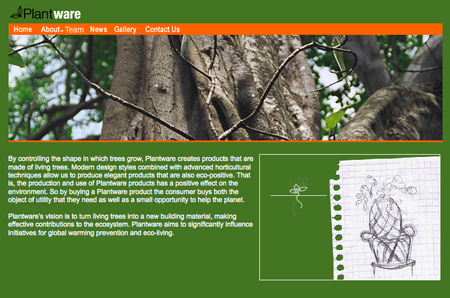Known by various names—such as tree shaping, arborsculpture, living art or pooktre—eco-architecture has been a fantasy of environmentalists and ecologists. Thanks to applications of research out of Israel, that fantasy is closer to becoming reality.

Plantware creates structures out of living trees
Tel Aviv University professors Yoav Waisel and Amram Eshel—who literally wrote the book on plant roots—are pushing the boundaries of eco-architecture through a bio-manipulation technique developed at the Sarah Racine Root Research Laboratory. Their work in aeroponics stems from a desire to engineer plants that are better equipped to find water. In the process, the researchers found ways to manipulate the growth of large plants into living sculptures.
This research has found a business application in the form of Plantware. The company was founded by CEO Gordon Glaze, a biotech inventor holding two worldwide patents for plant genetics. Glaze worked for several years on software supporting the Human Genome Project, turning to plant genomics in 2001 and founding his company the next year. Plantware completed construction of their aeroponic growth facility in 2005.
Plantware
One of their prototypes—a living bench—has been donated to a children’s playground at a Tel-Aviv hospital. The bench is held in shape with a removable wooden framework to keep the growing roots in place. The only permanent deadwood is the seat bench that will become embedded in the tree.
Pilot projects underway in the United States, Australia and Israel include playground structures, streetlamps and gates. “The approach is a new application of the well-known botanical phenomenon of aerial root development,” said Eshel. “Instead of using plant branches, this patented approach takes malleable roots and shapes them into useful objects for indoors and out.”
KinderForest – Growing a Playground
The first home prototypes will be ready in about a decade. While the method takes years, the result is a long-lasting architecture with other benefits, such as producing oxygen.
Sarah Racine is the first large-scale aeroponics lab in the world, founded 20 years ago by Waisel through funding by an Israeli family. Other projects include cultivating Euphoria tirucalii, a latex-producing shrub which can easily be grown in the desert as a source for biofuel.